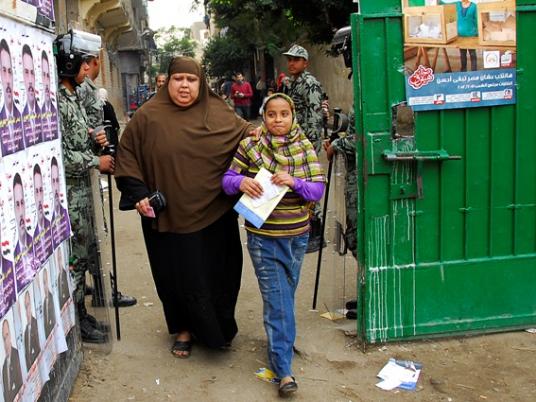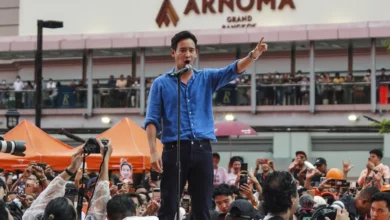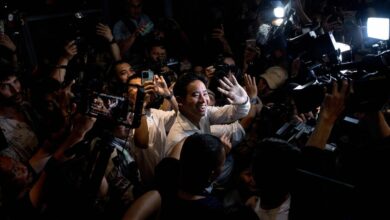
By 8 am, the four schools in the one-block radius between Road 3 and Road 4 in Maadi connected in what can only be described as a maze of lines. Women headed in opposite directions to the Thanaweya Girls School and the Kawmeya while the men queued up around the block for the Gomhoreya and met at the end of their line with men heading to the Tagrebeya.
Shouts of, “Where’s the end of this line?!” could be heard everywhere and replies were mixed with smug chuckles as voters in line for two hours already gathered satisfaction from sending newcomers around the block to begin their wait.
Older women came with folding stools and the variation in age was as extreme as the variation in attire — suits and ties stood next to ripped jeans and Palestinian scarves, work dresses and head scarves with colorful sweaters, designer handbags and leather riding boots, splashed with mud from the puddles of Sunday night’s rain.
“I wish I had brought a little chair,” complained Fatma, a 52-year-old Maadi resident standing behind me in line. “I wish I was over 60,” returned her friend, Mona, 57.
The wait in the Kawmeya line allowed me to head off three blocks to Road 9 and pick up fuul and taameya sandwiches for the jovial bunch of women sharing the line with me for four-and-a-half hours Monday morning. And while I felt slightly silly for picking up Coffee Bean on my way back for my own breakfast, I was comforted that people in Zamalek had things even easier.
Cilantro near the Kawmeya school in Zamalek sent its waiters out mid-day to gather orders and bring people coffee while in line.
“Many people ordered but most already came with their Starbucks in hand,” said Alia, a 19-year-old Zamalek resident.
In Heliopolis, Costa reportedly delivered coffee to voters on Monday and in Nasr City, individual candidates had campaigners hand out t-shirts with their pictures on them — one t-shirt per vote. With flyers aplenty, the voting day campaigner prize had to go to the Freedom and Justice party, which set up little booths and offered absentminded voters the opportunity to find their voting sub-station numbers online.
“I voted for the Thawra Mostamera,” says Adel, a graphic designer from Heliopolis, “but I felt a little guilty because I took my information from the Muslim Brotherhood booth outside the voting center.”
Female voters in Maadi gathered in line to discuss candidates and the reasons behind choosing one over the other, questioning candidate symbols and the fate of the ballot boxes overnight. Men stood on the opposite side of the street waiting for their wives, daughters and sisters to inch through the line and get through the voting process which, on average, seems to have taken four hours Monday morning around Cairo.
Traffic then clogged and Maadi became a cesspool of cars until 9 pm when voting centers closed for the night.




